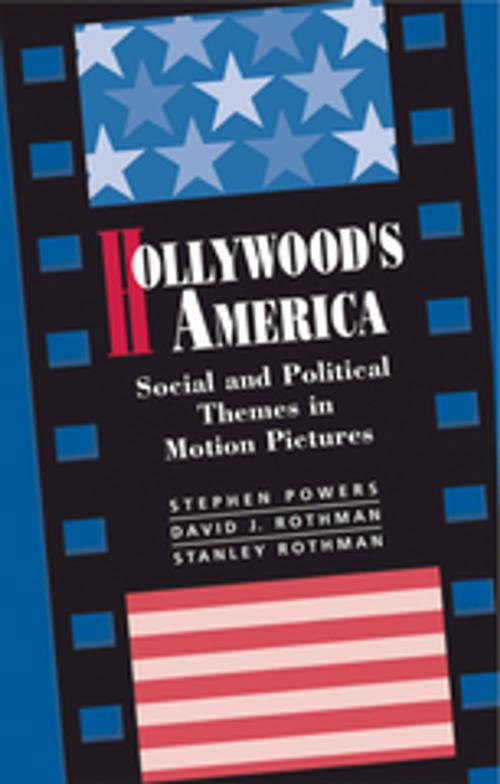Hollywood's America
Social And Political Themes In Motion Pictures
Nonfiction, Social & Cultural Studies, Social Science, Sociology| Author: | Stephen P Powers | ISBN: | 9780429973352 |
| Publisher: | Taylor and Francis | Publication: | February 19, 2018 |
| Imprint: | Routledge | Language: | English |
| Author: | Stephen P Powers |
| ISBN: | 9780429973352 |
| Publisher: | Taylor and Francis |
| Publication: | February 19, 2018 |
| Imprint: | Routledge |
| Language: | English |
American motion pictures still dominate the world market with an impact that is difficult to measure. Their role in American culture has been a powerful one since the 1930s and is a hallmark of our culture today. Though much has been written about the film industry, there has been very little systematic attention paid to the ideology of its creative elite. How does the outlook of that elite impact on the portrayals of America that appear on the screen? How do their views interact with the demands of the market and the structure of the industry to determine the product that is seen by mass audiences? Hollywood's America is a marvellously rich and careful discussion of these questions. It combines a meticulous systematic content analysis of fifty years of top-grossing films with a history of the changing structure of the industry. To that mixture it adds an in-depth survey of Hollywood's creative elite, comparing them to other leadership groups. The result is a balanced discussion of unique breadth and depth on a subject of national importance.Placing the film industry in the context of American society as a whole, the authors point out that Hollywood's creative leadership impacts the larger society even as it is influenced by that society. The creators of films cannot remove themselves too far from the values of the audiences that they serve. However, the fact that films are made by a relatively small number of people, who, as the authors demonstrate, tend to share a common outlook, means that, over time, motion pictures have had an undeniable impact on the beliefs, lifestyles, and action of Americans.This study contributes to the debate over the role and influence of those who create and distribute the products of mass culture in the United States.The book also contains a devastating critique of the poststructuralist theories that currently dominate academic film criticism, demonstrating how they fail in their attempt to explain the political significance of motion pictures.
American motion pictures still dominate the world market with an impact that is difficult to measure. Their role in American culture has been a powerful one since the 1930s and is a hallmark of our culture today. Though much has been written about the film industry, there has been very little systematic attention paid to the ideology of its creative elite. How does the outlook of that elite impact on the portrayals of America that appear on the screen? How do their views interact with the demands of the market and the structure of the industry to determine the product that is seen by mass audiences? Hollywood's America is a marvellously rich and careful discussion of these questions. It combines a meticulous systematic content analysis of fifty years of top-grossing films with a history of the changing structure of the industry. To that mixture it adds an in-depth survey of Hollywood's creative elite, comparing them to other leadership groups. The result is a balanced discussion of unique breadth and depth on a subject of national importance.Placing the film industry in the context of American society as a whole, the authors point out that Hollywood's creative leadership impacts the larger society even as it is influenced by that society. The creators of films cannot remove themselves too far from the values of the audiences that they serve. However, the fact that films are made by a relatively small number of people, who, as the authors demonstrate, tend to share a common outlook, means that, over time, motion pictures have had an undeniable impact on the beliefs, lifestyles, and action of Americans.This study contributes to the debate over the role and influence of those who create and distribute the products of mass culture in the United States.The book also contains a devastating critique of the poststructuralist theories that currently dominate academic film criticism, demonstrating how they fail in their attempt to explain the political significance of motion pictures.















